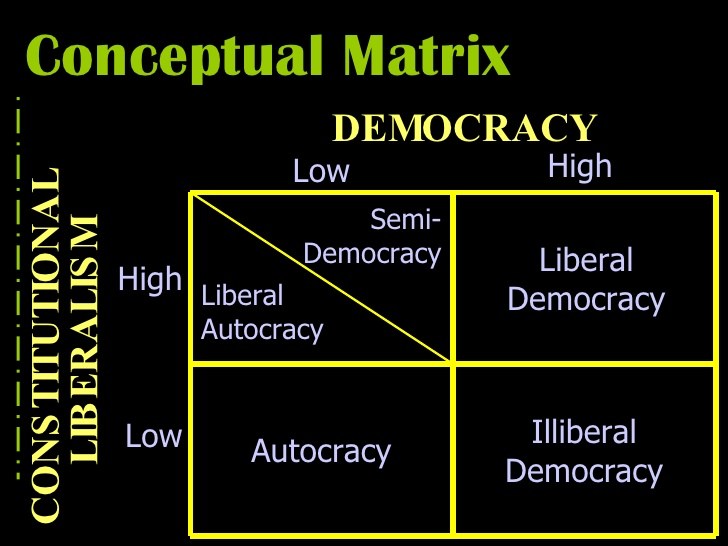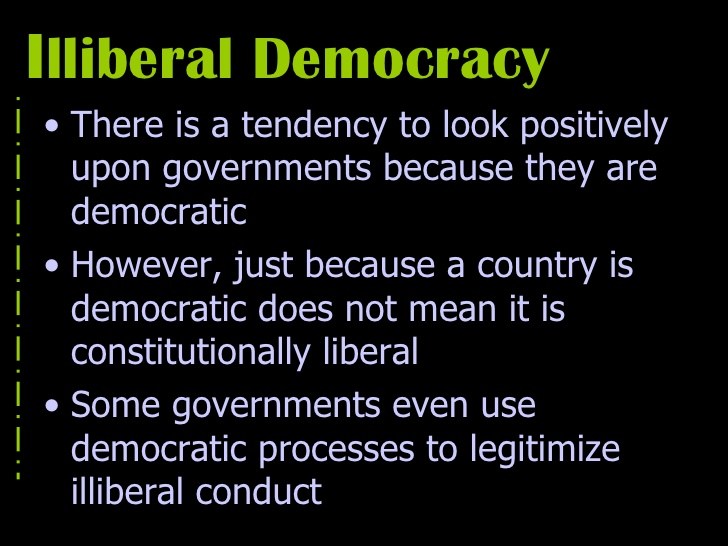Poland, Trump, And Hungary: This Is What Illiberal Democracy Looks Like – OpEd
By Mitchell Blatt*
The election of Trump, the Law and Politics Party winning a majority in Poland in 2015, and Viktor Orbán’s government in Hungary; what they all have in common is not merely a right-wing bend, but a contempt for liberal democracy. So goes the narrative, which has been particularly on display since Trump’s speech in Poland, that “illiberal democracy” is threatening the underpinnings of democracy in the Western world and beyond.
Some of the more conservative-minded would say this argument is the resentment of the losers. Trump, Szydlo, and Orbán won their elections fair and square. Why should they be dismissed just because you disagree with them? “If a democracy now needs to be a tool for spreading liberalism, conservatives are by definition, not democratic,” Sumantra Maitra wrote for Quillette.
Here is the thing: the problem isn’t simply with policy preferences but with the normative structures of democracy itself. These governments are taking actions to solidify their own power, not just to advance ideological interests of the people, but to advance the personal and party-based interests of the leaders or the ruling parties in ways that strike at the legal and moral underpinnings of democracy and rule of law.
A few examples will illustrate what exactly is meant by illiberal democracy. In Poland, the ruling party is trying to enact a measure that would give them control over the composition of the judiciary. As reported by Politico Europe:
Poland’s parliament, under the leadership of the conservative Law and Justice (PiS) party, passed a law dissolving an independent body responsible for the nomination of judges. At the same time, PiS submitted a draft law that would force the entire Supreme Court into retirement and give the country’s justice minister the ability to decide which judges can stay in their current roles.
Currently, Poland’s federal judges are appointed by a professional panel of lawyer. The Law and Justice party attacked the judges as leftists—the party chairman called the judiciary a “stronghold of post-communists”—and it is easy to see how a panel made up of lawyers could be attacked as “elitist” and biased to be more favorable towards political liberalism than the public, due to expected leanings within the field. Perhaps there is a case to be made for having judges appointed by the president, prime minister, parliament, or some combination thereof, as is done in places like the United States and South Korea. Although there are problems with the system in the U.S., which has resulted in the politicization of judicial appointments, there is a case to be made for some level of political accountability in the process.
The problem is that the manner by which Law and Justice is planning to implement this program appears meant to give their party control over the composition of the court so that they can protect their policies from legal scrutiny. The important point is that they want to eliminate all the current justices. The BBC reported, “That bill would mean that all sitting supreme court judges would lose their posts and the National Council of the Judiciary would appoint new judges.”
Packing the court with judges approved by a specific political party to defend the interests of that party is something that communist dictators do in places like Venezuela. The court exists to defend the rights of the people. A party elected by a plurality, or a majority, or even a referendum enacted by a majority, doesn’t have unlimited power to pass laws that violate people’s rights. That people have inalienable rights is a fundamental fact of natural law and democracy.
As the chart created by Brian Belen, based on Fareed Zakaria’s “Rise of Illiberal Democracies” shows, liberal democracy is not about liberal politics but liberal constitutionalism.
A country needs checks and balances to prevent the ruling party from abusing power for its own self-aggrandizement. The court functions as an important check. If the court includes only shills for the ruling party, that check is eliminated.
The proposal by Law and Justice could eliminate that check by simply getting rid of all the justices they don’t like. It’s not the same as the system in the United States. U.S. Supreme Court justices are selected through nomination by the President and confirmation by Senate, and they are given lifetime terms, meaning that they aren’t automatically replaced every time a new president or Congress is elected. Given the usual shift between Republican and Democratic control of government, that means that there will always be some justices nominated by Republicans and some by Democrats, and their lifetime appointments mean justices don’t face the risk of being pulled from the court because the majority party disagrees with their ruling. The key to creating an impartial system, then, is to put some separations in between the power of the party and the power of the courts so that the courts can’t be controlled by the party to serve its interests.
The Law and Justice party has already shown it is willing to trample on the checks and balances of the courts for its own power. When party member Mariusz Kamiński was sentenced to prison for abuse of power, the government pardoned him before the case was finalized, making the pardon an illegal interference in the justice system, according to the high court. The government, however, ignored the court’s ruling and illegally kept Kamiński serving in the government.
U.S. President Donald Trump has also shown a contempt for the judiciary. After a judge ruled against his travel ban, he called the judge a “so-called judge” and blamed him for any potential future terrorist attacks. When the travel ban was first put on hold by judges, there were a few days when the rulings were reportedly being ignored.
While the administration has since complied with rulings, even the hysterically-unhinged attacks on the idea of judicial review and freedom of the press have a deleterious effect on democracy and liberty. Using words of Soviet dictators to attack the press—calling them “enemies of the people”—runs counter to American ideals.
Trump’s attacks on democratic institutions help destroy public trust in democratic institutions. He is causing Republicans to put their trust in a demagogue above all else. He is also, by defining down the standards of public office, opening the gate for other unqualified celebrity hacks like Kid Rock, the Rock, and Bruce Jenner to plausibly hold office. Democrats, hungry for defeating Trump, won’t hold themselves to high standards either, if they think they need to fight just as dirty as the other side to win. (“Democrats Should Lie Like Donald Trump,” Jeet Heer has written for The New Republic.) By publicly threatening to use the tax code to punish his enemies (the Washington Post) he is introducing thuggish totalitarian ideas closer to mainstream thought than they were before.
The #AmazonWashingtonPost, sometimes referred to as the guardian of Amazon not paying internet taxes (which they should) is FAKE NEWS!
— Donald J. Trump (@realDonaldTrump) June 28, 2017
It is said that Trump isn’t a wanna-be tyrant, that he’s just incompetent. Actually, he’s both. The problem is that he’s paving the way for a more politically-astute demagogue to do what he’s talking about doing.
More politically-astute illiberal democrats are now abusing their power at the local level in states across America in some of the same ways as those in Poland. In North Carolina, the Republicans, knowing they had lost the governor’s office, intentionally took power from the incoming Democratic governor. As in Poland, the measure was intended to give the legislative majority party more power for itself while disguising itself as an innocuous structural reform.
Among the bills introduced on Wednesday are measures that would make Cabinet appointees subject to state senate approval, remove the governor’s power to appoint trustees of the University of North Carolina system and the state board of education, and eliminate other gubernatorial appointments.
The bills were introduced and passed in an additional special session that occurred after the Republican governor lost a reelection campaign and signed before he left office. If the Republicans really believed that the legislature—any legislature—should have power over appointments, then they would have passed the changes long ago. Transparently, they did it because they wanted to take power away from the Democratic governor. Luckily, the North Carolina courts remain independent and struck down many of the illiberal changes.
Other Republican ideas on how to maintain power long after they lose statewide or nationwide majorities have been considered for years, as the Republicans see demographics changing. Gerrymandering districts, combined with natural concentration of minorities and liberal-leaning groups in cities, has made Republican Congressional majorities exceed their share of the vote in the past decade. Some Republicans have thought about structuring the electoral college votes of their states based on Congressional districts, so that even in states where Democrats win a small majority throughout the state, Republicans can still win a majority of the electoral votes (similar from what happens in American elections on the national level). Republicans have also tried to make it harder for people who are less likely to obtain certain types of identification documents to vote, which would predictably make it harder for Democratic-leaning voters to vote. Trump’s “voter fraud” commission is an attempt to do that. He is collecting names of voters nationwide so that they can create a database in which a large number of false positives will make it look as though there were illegal voters (multiple voters who share the same name with each other look like they “voted twice,” or voters who share the same name as a convicted felon, or voters who moved out of state and don’t vote in their previous state anymore but remain on the voter list).
Most complaints about illiberal democracy are not about policy debates. They’re not about whether taxes should be cut or whether gay people should be allowed to marry. The real issue is about the rights of citizens and residents being protected and about the electoral and legislative system being fair and competitive. A liberal democracy must protect rights and check power.
Slide images from Brian Belen’s presentation on illiberal democracies. Notably he taught the course from 2003-05; illiberal democracy is not a new development or a new worry.
*Mitchell Blatt has been based in China and Korea since 2012. A writer and journalist, he is the lead author of Panda Guides Hong Kong guidebook and has contributed to outlets including The National Interest, National Review Online, Acculturated, and Vagabond Journey. Fluent in Chinese, he has lived and traveled in Asia for three years, blogging about his travels at ChinaTravelWriter.com. You can follow him on Twitter at @MitchBlatt.
This article was published at Bombs and Dollars.


What garbage. If you honestly think that the majority of illiberalism in the US is coming from Trump…and not from the “liberal” left…then how can anyone with a pair of eyes and ears take you or your party seriously?
And the those countries that was on the travel ban list…was created during Obama’s time in office…you know….the countries he was bombing the $h!t out of with his drones…
Fake news…NEXT!